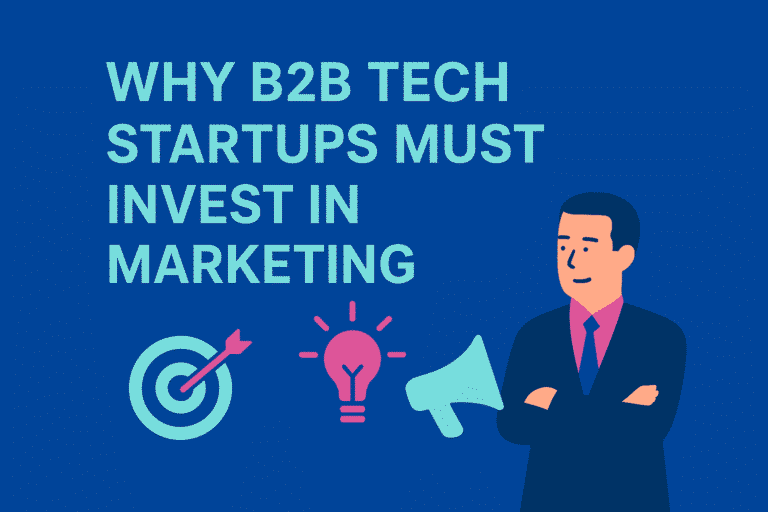The Negative Outcomes Can Be Significant…
- Absent differentiated value proposition
- Weak brand and company identity
- Reduced marketing team morale
- Poor effectiveness of campaigns
- Lack of creativity and innovation
- No consistency in messaging

A Concerning and Regressive Trend
The relationship between marketing and sales in B2B tech startups is a critical factor in determining the overall success of the business. Both teams play distinctly different, yet complementary roles and their effective alignment and collaboration are essential to driving growth. However, there is a concerning and growing trend of consolidating marketing’s reporting line under the sales leader. This makes no sense at all but is a trend I often see in early-stage and even established small tech firms. There is a reason why many of these businesses remain small after many years of operation. A regressive organisational structure, that subordinates one team under the other results in a marginalised and weak marketing function.
Poor Thinking
When marketing reports to sales, it inevitably has a detrimental effect on performance, morale and ultimately, a negative impact on the company’s success. Worryingly, the trend of sales leaders, such as the Chief Revenue Officer (CRO), overseeing both marketing and sales teams appears to be gaining traction. Tech founder-CEOs are particularly prone to putting marketing under sales, and it’s one of the most common organisational missteps in early-stage startups. It’s a strategy that comes from a place of poor thinking that promotes deficient results. The real danger is that this structure persists, even after the teams grow and have more resources available.
Why Tech Founder-CEOs Do This More Than Others
Having an engineering and technical background is a positive characteristic of tech founders when developing innovative new solutions but can be a limiting factor when it comes to go-to-market strategy. They view sales as the measurable, revenue-driving function, while marketing is seen as “soft” or supportive and just another cost centre. The result is that marketing often gets subordinated under sales because it’s closer to the money. This is usually because they only see marketing as a lead generation function, having little understanding of market positioning, messaging, customer segmentation and brand building.
A Demonstration of Inexperience
This myopic view doesn’t see the strategic importance and long-term value of marketing, so inexperienced tech founders compress it into sales operations. This can be a consequence of short-term revenue pressure, especially in the early stages when there’s intense focus on growth metrics. Sales delivers these faster, so tech founders often force marketing to serve sales targets, at the expense of brand and marketing strategy. Inexperience in go-to-market strategy makes it hard for tech founders to appreciate what a well-run marketing function looks like, so they delegate to whoever owns the pipeline because they don’t want or know how to do it. This is extremely common in series A/B startups before hiring a strong CMO or VP of Marketing.
Don’t Skip the Process
Some founders may already have this information ingrained in their psyche, as they already have expert knowledge of the customer problem. In these circumstances, it could be this expertise that inspired them to start a new business in the first place. Even so, whilst having this knowledge gives you a head start and is very helpful indeed, it is still important to go through the process and articulate the problem as best you can. In this scenario, your existing knowledge may help you get to a workable output a bit faster, but you will still need to test and validate it with the market.
It Just Doesn’t Work
The consequence of this shortsightedness is that marketing becomes reactive and execution only. No one owns customer insight, brand voice or strategic positioning, resulting in a lack of competitive edge, wasted budget and an inability to grow awareness. All these factors will seriously limit any startup’s ability to scale. There is growing evidence, both academic and industry-based, that when marketing reports into sales in B2B tech startups, it can significantly reduce marketing effectiveness, strategic impact, and long-term brand equity.
What the Research Says:
- According to the 2023 OpenView Partners “SaaS Benchmarks Report,” 67% of B2B SaaS startups under $20M ARR had marketing reporting to sales. Those same companies were 40% less likely to have a clear brand positioning statement. Also, their content engagement and inbound pipeline underperformed peer companies with independent marketing leadership.
- The 2022 Forrester research study, “Marketing-Led Growth in a Buyer-Driven World,” found that B2B marketing teams under sales-led structures focus more on short-term lead generation than brand building or market insight. They are 50% less likely to own strategic functions like customer insight, positioning and lifecycle marketing. The result is that marketing performance becomes reactive, not proactive.
- Gartner’s 2022 “CMO Strategic Priorities Report,” says in B2B organisations where marketing is subordinate to sales, CMOs report less control over budget allocation, fewer brand strategy initiatives and lower visibility in the C-suite discussions. Marketing teams focused narrowly on sales support lose their strategic voice.
- In the Harvard Business Review paper, “Why Sales Shouldn’t Control Marketing” 2021, it states that when marketing reports into sales it creates a conflict of purpose. Sales want short-term wins, while marketing needs to play the long game. Innovation and customer research decline, since marketing becomes an execution function, not a strategic one.
How Tech Founder-CEOs Sabotage Their Success
The bad practice of putting marketing under sales to speed up lead generation seems to be increasing. Subservience leads to inefficiencies, wasted resources and missed opportunities, resulting in a lack of brand consistency, weak positioning, burnout in marketing teams focused solely on Marketing Qualified Leads (MQLs) and poor market insight and customer feedback loops. Consolidation of two different teams under sales leadership leads to tactical short-term thinking, underpowered strategic plans, neglected brand development and lower creative and content performance.
Aligned Peers – Not Underlings
Research by Forrester and Gartner supports the idea that organisations with well-aligned but independently led marketing and sales teams tend to perform better. They require shared goals to ensure they work together seamlessly but are interdependent teams and must never be treated as a single entity. Their respective leaders must operate as equal peers within a wider leadership team. This structure ensures that both functions are given equal importance and that their unique contributions are recognised and valued.
Benefits of Partnership Between Marketing and Sales Leaders
Here are some of the benefits of creating and maintaining a healthy and equal relationship between marketing and sales leaders and their teams:
- Balanced Decision Making
Decisions are made through collaboration, data, situational analysis and consensus rather than top-down mandates, personal agendas or knee-jerk gut reactions. Collaboration provides a sounding board for each leader to discuss and validate new ideas and make suggestions. This leads to more balanced and effective strategies that take the long-term needs of the business into account as well as short-term revenue goals.
- Mutual Respect and Trust
Peer leadership promotes an environment of mutual respect and trust at every level across both functions. Teams are more likely to work together effectively when they feel that their contributions are equally valued, and they have a voice to input ideas. This collaboration is essential for creativity, producing integrated go-to-market campaigns that drive results.
- Specialised Leadership
Both teams require different skillsets and expertise that must be recruited and developed appropriately. Tech startups must be focused on executing their plans with no distractions. A leader with a background in sales will not fully understand the nuances of marketing, and vice versa. By having separate leaders for each function, tech companies ensure that both teams receive the specialised guidance and support they need to excel.
The Final Reconning
The relationship between marketing and sales is too important to be left to chance or compromised by inept decisions. While it may be tempting to take the easy option and consolidate leadership, this approach represents far too much risk. Instead, focus on creating a structure where marketing and sales leaders are treated as peers, each bringing their unique expertise to the table.
Forrester’s 2020 report, “Sales and Marketing Alignment Still Matters,” showed that companies with high alignment between marketing and sales, as peers, experienced:
- 36% higher customer retention
- 19% faster revenue growth
- 15% higher profitability
This alignment was explicitly defined as collaborative leadership, shared goals and KPIs, but separate functional ownership, not a hierarchy with marketing under sales.
You may want to read: “Why Marketing is the Tech Startup Growth Engine.”






